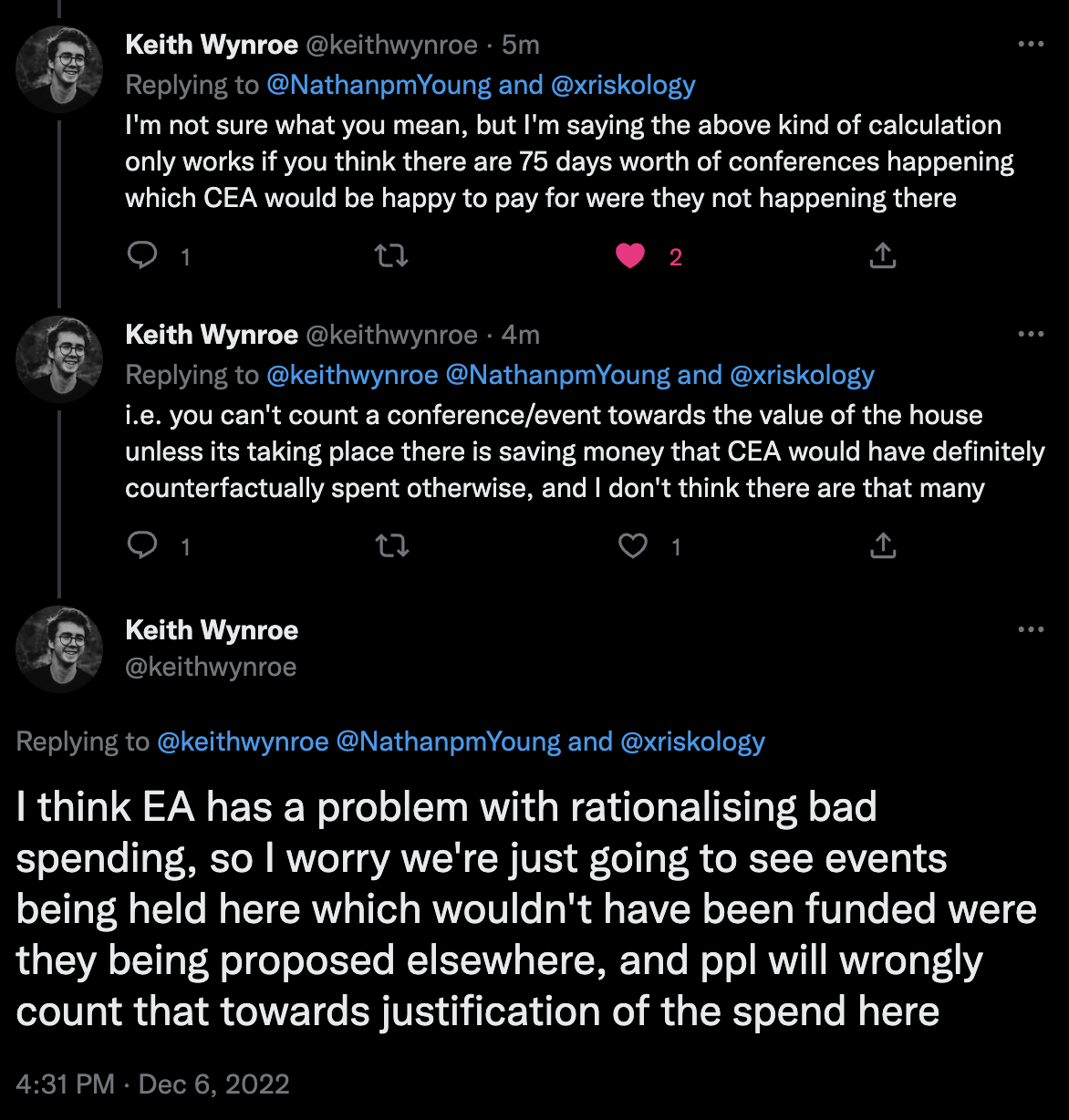Edit to add (9/1/2023): This post was written quickly and I judged things prematurely. I also regret not reaching out to Effective Ventures before posting it. Regarding my current opinion on the Abbey: I don't have anything really useful to say that isn't mentioned by others. The goal of this post was to ask a question and gather information, mostly because I was very surprised. I don't have a strong opinion on the purchase anymore and the ones I have are with high uncertainty. More thoughts in my case for transparent spending.
Yesterday morning I woke up and saw this tweet by Émile Torres: https://twitter.com/xriskology/status/1599511179738505216
I was shocked, angry and upset at first. Especially since it appears that the estate was for sale last year for 15 million pounds: https://twitter.com/RhiannonDauster/status/1599539148565934086
I'm not a big fan of Émile's writing and how they often misrepresent the EA movement. But that's not what this question is about, because they do raise a good point here: Why did CEA buy this property? My trust in CEA has been a bit shaky lately, and this doesn't help.
Apparently it was already mentioned in the New Yorker piece: https://www.newyorker.com/magazine/2022/08/15/the-reluctant-prophet-of-effective-altruism#:~:text=Last year%2C the Centre for Effective Altruism bought Wytham Abbey%2C a palatial estate near Oxford%2C built in 1480. Money%2C which no longer seemed an object%2C was increasingly being reinvested in the community itself.
"Last year, the Centre for Effective Altruism bought Wytham Abbey, a palatial estate near Oxford, built in 1480. Money, which no longer seemed an object, was increasingly being reinvested in the community itself."
For some reason I glanced over it at the time, or I just didn't realize the seriousness of it.
Upon more research, I came across this comment by Shakeel Hashim: "In April, Effective Ventures purchased Wytham Abbey and some land around it (but <1% of the 2,500 acre estate you're suggesting). Wytham is in the process of being established as a convening centre to run workshops and meetings that bring together people to think seriously about how to address important problems in the world. The vision is modelled on traditional specialist conference centres, e.g. Oberwolfach, The Rockefeller Foundation Bellagio Center or the Brocher Foundation.
The purchase was made from a large grant made specifically for this. There was no money from FTX or affiliated individuals or organizations." https://forum.effectivealtruism.org/posts/Et7oPMu6czhEd8ExW/why-you-re-not-hearing-as-much-from-ea-orgs-as-you-d-like?commentId=uRDZKw24mYe2NP4eq
I'm very relieved to hear money from individual donors wasn't used. And the <1% suggests 15 million pounds perhaps wasn't spent. Still, I'd love to hear and understand more about this project and why CEA thinks it's cost-effective. What is the EV calculation behind it?
Like the New Yorker piece points out, with more funding there has been a lot of spending within the movement itself. And that's fine, great even. This way more outreach can be done and the movement can grow. But we don't want to be too self-serving, and I'm scared too much of this thinking will lead to rationalizing lavish expenses (and I'm afraid this is already happening). There needs to be more transparency behind big expenses.
Edit to add: If this expense has been made a while back, why not announce it then?


On the flip side, it seems the Abbey is likely to require less in the way of upfront renovations, which seem to me to be the significant at-risk part of the Inn, because the sorts of changes you're likely to want to make it a good venue for running workshops probably make it an objectively worse 'hotel', which is what almost anyone else would be buying the space to get.
It seems the two are within a factor of 2 of each other for long term cost, most likely in your favor, while they may have you beat a bit in terms of non-recoverable conversion expense.
In the end it is surprisingly close, all things considered, given quite how different Oxford and Berkeley are.